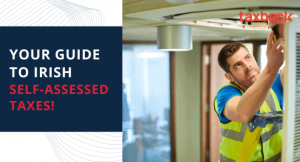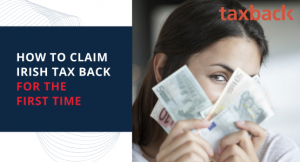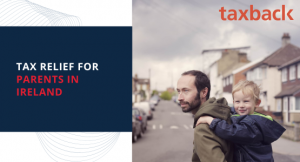Budget 2017 Podcast: What Worked and What Fell Short in the Last Budget?
Let's talk about last year's budget; what worked and what really tanked?
Did we learn anything from last year's budget? Was Irish Water a complete failure? Why wasn't USC scrapped?!
In this podcast we discuss what items worked well and what things were a complete failure or disappointment.
Podcast Transcript
Hello and welcome to Taxback.com's Budget 2017 podcast, today we'll be covering what worked and what fell short in last year's budget with our tax experts Barry Flanagan and Christine Keily.
Ciara: So guys, when did the austerity budgets end and how did the public feel the change?
Christine: Well I believe that officially there were 7 austerity budgets starting from the two budgets from the 2009 tax year bringing us through to the budget of December 2013. And here we saw the increase in the DIRT rate. It could be said that the 2014 budget was the first time we saw any kindness with the USC and the tax rate reductions. Also when we look at budgets really from 2009 through 2016; we saw in the years 2009, 2011 what would be termed as tax raising budgets, where we saw items such as increased exchequer takes from personal tax, the broadening of the tax base, attempts to minimise the impact on the low and middle earners came in here too. And also we saw some moves to ensure that high earners' income bore the higher burden.
Then from 2012 to 2016 we saw what are sometimes called the tax reducing budgets, where we saw measures to take the lowest earners out of the tax net, some capped rate reductions in the gains for the higher earners, the tapering of the PRSI credit to benefit the minimum wage earners, and then the beginning of the equalisation of treatment of the self employed people.
Barry: Yeh I think there really has to be a question asked as to whether austerity budgets have actually ended. I think that it's pretty clear that they haven't. While there may not be any new or additional measures being introduced now to raise revenue other than I think the sugar tax is one of the few that's going to be introduced and even that's going to be delayed 'til 2018.
Effectively, we're still paying an awful lot more tax than we were back in 2006/2007 so to say that austerity, austerity isn't getting any worse, but we still have a long way to go to get back em the way we were in the mid-2000's so effectively we are still in the midst of austerity budgets, we are still trying to make up a deficit that we have, we are still trying to balance the books. So em, while there's no new fresh pain there certainly is still a lot of the old pain still there.
The average Irish tax refund is €1,880
Ciara: And how has GDP, borrowing and debt, and quality of life changed?
Christine: Well we look at GDP, we're informed that this is up, but I understand this is pretty much skewed by what is known as leprechaun economics. Em.. and also to to consider does this actually have any great impact on people living and working in Ireland? We also see that the national debt is coming down and is as I understand below the EU average, but I don't think this is necessarily something that is transferring to people in terms of quality of life.
Barry: Yeh yeh I fully agree with that, all of the headline figures we have are improving but really this is a message that was given clearly in the last election, while people can talk about the headline figures, in terms of quality of life for the average person on the street, the improvement is slow. Am..it's certainly there I would argue in Dublin, but outside Dublin, em the impact on quality of life has not been as pronounced or as quick,em it is something that is improving, but improving far too slowly for a lot of people's likes.
Ciara: And do you think recent budgets were too soft or too tough?
Christine: Think that's a difficult question and really it depends on whose looking at it really, I don't think that there will be very many taxpayers out there feeling that eh recent budgets were too soft. We certainly have seen improvements in the GDP and the national debt and that would very much suggest that the government achieved what was intended. Should that have been done slower or quicker? Budget 2012 to 2016 did bring benefits for lower earners taking more out of the tax net and providing relief in respect of PRSI but was this enough?
Barry: Yeh it's it's really difficult to say at any one point in time whether it's too hard or too soft, at the moment you could make an argument that they were too hard and that really if there were, if the cuts weren't as severe, maybe peoples' spending wouldn't have fallen off as much as it did in 2009-2011. At the same time, ye know six months down the line, when em article 50 is envoked in the UK and we're left with the situation whereby ye know Brexit actually begins to take effect, we could be looking back and saying actually the budgets were too soft because they didn't prepare us for the additional outside changing conditions so, its a really em it's a very subjective question and one that it think the answer would change to on a monthly basis.
Ciara: And who do you think fared best in recent budgets?
Christine: I think again that that's a very difficult one and probably would be answered by nobody really well at all.
Barry: Nobody yeh
Christine: Em, particularly I think for the for the lower earners they certainly saw some benefits but I would say that in most instances that didn't really feel like it was near enough and em higher earners are definitely probably feeling very hard done by eh due to some of the changes there with the introduction of the caps on reliefs via the USC.
Barry: Yeh some families have been given a bit more relief than perhaps single people have been, but really ye know it's a very relative question again. Who fared well? Well nobody is the short answer em.., some people have fared slightly better than others but again...nobody is better off than they were in '07.
Free PDF guide to PAYE taxes in Ireland
Ciara: What items do you think worked well from Budget 2016?
Christine: Again in answering this question I guess it depends on who who is looking at it, definitely the reduction in the USC and tax rates were generally welcomed. Em the increase in the home carer credit was also very much need and the retention of the 12.5% corporate tax rates is definitely a good mood for the economy.
Barry: And especially now given the recent ruling on Apple. I mean the certainty that international companies are looking for that our tax rate isn't going to change is badly need to retain their confidence in our system.
In terms of items that worked well, those would really be the headline ones.
Ciara: And what items fell short or just didn't work?
Christine: Probably top of the list would be the water charges coupled with the DIRT relief for the first time buyers, where there was really no uptake.
Barry: Yep that measure, it didn't really come across that it was going to have a huge impact it was supposing and it was presuming that there first time buyers out there who had huge savings in bank accounts that were just waiting to suddenly invest ye know hundreds of thousands on properties and that these huge savings had been attracting massive DIRT, which of course they hadn't been so I think the impact of that there there were half a dozen people country wide who took advantage of the DIRT relief for first-time buyers.
Some other couple of areas that they could certainly improve, the SARP, the Special Assignee Relief Programme, the enter, the entrepreneur relief being very narrow, those haven't really had a huge impact in the same way that similar measures have in other countries and certainly there's scope for for SARP for inward investment incentives to improve and for also for indigenous incentives for entrepreneurs to improve as well.
Christine: So were any announcements made in the budget that still haven't been implemented?
Christine: There's always some things that don't happen as the budget passes through the various stages in the government, changes are made. Usually, any items that are subject to ministerial order can get delayed and I think a prime example of that would be the parkin' levy from a few years ago that just hasn't happened to date.
Ciara: And finally when is the best time to apply for a tax refund with Taxback.com?
Christine: I think the message there is there is no time like the present, the sooner you get your refund application in, the quicker you'll have the fund in your pocket this time of year, we're coming up to the run in to Christmas, I'm sure that most people would welcome the funds asap.
Barry: Absolutely, a soon as you can is always the message for that. Em, it is of course dependent on how quickly Revenue can process the application that we send in on your behalf but em, the quicker they're in, they are processed in a chronological order so there's no sense in waiting.




